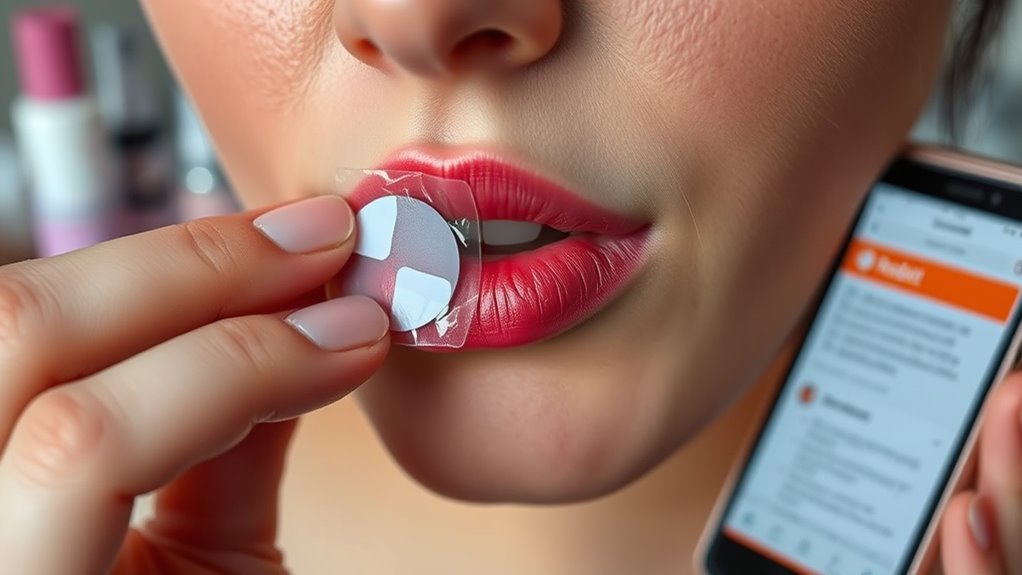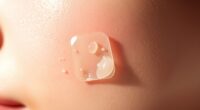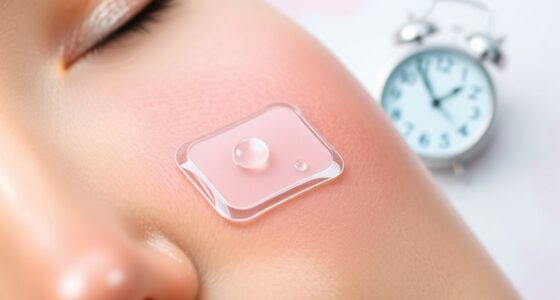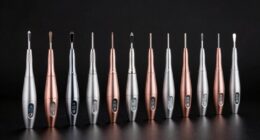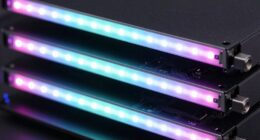You shouldn’t put a pimple patch on a cold sore. Pimple patches lack antiviral properties and can trap moisture, which worsens the cold sore and prolongs healing. They might even spread the virus. Instead, opt for antiviral treatments or soothing agents for effective relief. Maintaining hygiene and managing triggers are also essential. If you’re curious about the right ways to treat cold sores, there’s more helpful advice ahead.
Key Takeaways
- Pimple patches lack antiviral properties needed to treat cold sores effectively, making them unsuitable for this purpose.
- Using pimple patches on cold sores can trap moisture, potentially delaying healing and promoting viral replication.
- There’s a risk of spreading the herpes virus to other areas or individuals when using pimple patches on cold sores.
- Skin irritation and discomfort may occur due to the inappropriate use of pimple patches on cold sore lesions.
- For cold sore relief, consider antiviral creams and soothing agents instead of pimple patches.
Understanding the Difference: Pimple Patches vs. Cold Sores

When you’re dealing with skin issues, it’s crucial to understand the difference between pimple patches and cold sores.
Pimples arise from clogged hair follicles due to bacteria, oil, and dead skin cells. They’re not contagious, appearing as red bumps, often with a white or black head. Non-inflammatory acne includes whiteheads and blackheads, which can also be treated with patches.
Pimples form from clogged hair follicles, featuring red bumps that can include white or black heads, and they are not contagious.
In contrast, cold sores are caused by the herpes simplex virus and are highly contagious. They show up as fluid-filled blisters near your lips, usually starting with a tingling sensation.
While pimples can be treated with acne creams and patches, cold sores require antiviral medications.
Recognizing these differences helps you choose the right treatment and avoid aggravating your condition, especially when it comes to using patches on cold sores.
How Pimple Patches Work on Acne

Pimple patches are a convenient solution for tackling acne effectively. These patches use hydrocolloid technology to absorb excess oil and pus, promoting faster healing. They create a protective barrier, shielding your skin from dirt and bacteria while managing the fluid released by the pimple.
Active ingredients like salicylic acid and tea tree oil work to reduce inflammation and speed up healing, while hyaluronic acid adds moisture to balance out drying effects. Additionally, hydrocolloid patches are known for their ability to change color when they effectively absorb exudate, indicating their moisture-absorbing properties that facilitate healing.
You’ll also appreciate how pimple patches prevent you from picking at blemishes, reducing the risk of infection. Suitable for mild breakouts and whiteheads, these patches are gentle enough for all skin types, making them a discreet and effective option for acne treatment.
The Nature of Cold Sores and Their Treatment

Cold sores, small but painful blisters caused by the herpes simplex virus (HSV), often appear unexpectedly around the mouth. They’re highly contagious, spreading through skin-to-skin contact or by sharing personal items. About 90% of people worldwide carry some form of HSV. Usually triggered by stress, fatigue, or sun exposure, cold sores progress from tingling sensations to blister formation, then to scabbing as they heal. Early symptoms include itching and burning, followed by fluid-filled blisters. Treatment primarily involves antiviral creams and medications, which can help manage symptoms. While cold sores typically heal on their own within 7-10 days, using a cold compress or aloe vera can provide soothing relief. The virus remains in the body for life, making it essential to recognize triggers and take preventive measures. Prevention includes managing stress and using SPF lip balm.
Why Pimple Patches Aren’t Suitable for Cold Sores

While pimple patches might seem like a quick fix for various skin issues, they’re not suitable for treating cold sores due to significant differences in their underlying causes and treatment needs.
Cold sores, caused by the herpes simplex virus, appear as fluid-filled blisters, while pimples result from clogged pores and bacteria. Unlike pimples, cold sores are highly contagious and require antiviral treatments for effective management. Pimple patches lack the necessary antiviral properties and may even worsen the condition by trapping moisture, which can create an environment conducive to viral replication. They’re designed to absorb excess oil and promote healing in pimples, not to address viral infections. For cold sores, opt for antiviral creams or dedicated cold sore patches that better meet your treatment needs. Additionally, understanding the importance of selecting the right cold medication can aid in managing symptoms associated with cold sores. Regular awareness of symptoms of viral infections can also help in early detection and treatment.
Risks of Using Pimple Patches on Cold Sores

Using pimple patches on cold sores can lead to several risks that undermine effective treatment.
First, these patches lack antiviral properties, failing to combat the herpes simplex virus. Trapping moisture beneath the patch can delay healing and create a humid environment that promotes viral replication.
Pimple patches lack antiviral properties, potentially delaying healing and creating an environment that encourages viral replication.
You also risk increasing contagion, as the patch may spread the virus to other skin areas or individuals.
Additionally, discomfort and irritation may worsen because pimple patches aren’t designed for cold sores. There’s a potential for worsened symptoms, like pain and swelling, and improper use could harm the skin around the sore.
Alternative Treatments for Cold Sores

When you’re dealing with a cold sore, exploring alternative treatments can provide relief and promote faster healing.
Aloe vera gel soothes the skin and may fight viruses, while lemon balm is known for its healing properties. Peppermint oil can also be effective against cold sores, and manuka honey serves as a powerful topical treatment. Additionally, using over-the-counter creams can help keep the skin soft during healing. Incorporating nutrient-rich foods into your diet, such as those found in a vegetarian diet, can enhance your immune system and support overall healing. Consuming foods rich in vitamin C, which helps combat viruses, can further support your immune response. Drinking freshly squeezed juices, like fresh orange juice, can also provide essential vitamins that may help with recovery.
Don’t overlook vitamin C, which helps combat viruses and supports overall healing.
Natural oils like tea tree and clove oil exhibit antiviral effects, and using cold compresses can relieve pain and swelling. If you’re considering supplements, L-lysine may help prevent outbreaks. Incorporating these remedies into your routine can enhance your healing process and keep cold sores at bay.
Expert Advice on Managing Cold Sores Effectively

Managing cold sores effectively requires a proactive approach tailored to your individual needs. Start by recognizing triggers like stress or illness, and take steps to minimize them. Use antiviral creams, such as aciclovir, at the first sign of an outbreak to reduce severity. Prioritize hygiene by avoiding direct contact with others and washing your hands frequently. Support your immune system with a balanced diet, adequate sleep, and stress management techniques. Protect your lips from UV rays using SPF lip balm. Cold sores are highly contagious, so it’s essential to avoid sharing personal items during an outbreak. If you experience frequent outbreaks or complications, consult a healthcare professional for personalized advice.
Frequently Asked Questions
Can I Use a Pimple Patch on a Fresh Cold Sore?
No, you shouldn’t use a pimple patch on a fresh cold sore.
While it might seem helpful, pimple patches aren’t designed for viral infections and lack the antiviral properties needed to treat cold sores. They could irritate the sensitive skin and even trap moisture, worsening the situation.
Instead, opt for antiviral creams or patches specifically made for cold sores to promote healing and prevent spreading the virus.
Prioritize effective treatment for better results.
Will Using a Pimple Patch Worsen My Cold Sore Symptoms?
Imagine trying to put a Band-Aid on a leaky faucet.
Using a pimple patch on your cold sore might feel like that. While it might seem convenient, it could actually worsen your symptoms. Pimple patches trap moisture, possibly leading to irritation or delays in healing.
Instead, focus on antiviral creams designed for cold sores. They target the root cause, helping you recover faster and more effectively without the complications of misplaced patches.
Are There Any Side Effects of Pimple Patches on Cold Sores?
Using pimple patches on cold sores can lead to several side effects.
You might experience increased discomfort and irritation due to moisture retention, which can worsen your symptoms. The patch won’t address the underlying viral infection, delaying healing and possibly encouraging viral replication.
Additionally, there’s a risk of spreading the infection.
Instead of pimple patches, consider using antiviral treatments or specialized cold sore patches for better relief and healing.
How Long Can I Leave a Pimple Patch On?
Ever wonder how long you can keep a pimple patch on?
Typically, you can leave it on for several hours or even overnight. If you’ve got sensitive skin, though, consider removing it sooner to avoid irritation.
Just remember to replace the patch if it gets dirty or too humid. This way, you’ll guarantee it continues to protect your skin and aid in healing, so you can get back to feeling your best!
Can Pimple Patches Prevent Cold Sore Outbreaks?
Pimple patches can’t prevent cold sore outbreaks.
They’re designed to treat acne, not viral infections like cold sores. While they might offer a barrier, they don’t have the antiviral properties needed to address the herpes simplex virus.
Using them could even worsen your cold sore by trapping moisture.
Instead, consider antiviral medications or cold sore patches specifically formulated for effective treatment and prevention.
Always consult with a healthcare professional for the best advice.
Conclusion
So, can you really use a pimple patch on a cold sore? While it might seem like a clever hack, the truth is that pimple patches aren’t designed for viral infections like cold sores. They won’t provide the relief or healing you need and could even cause irritation. Instead, stick to proven treatments like antiviral creams. Remember, taking care of your skin means knowing what works best for it!
